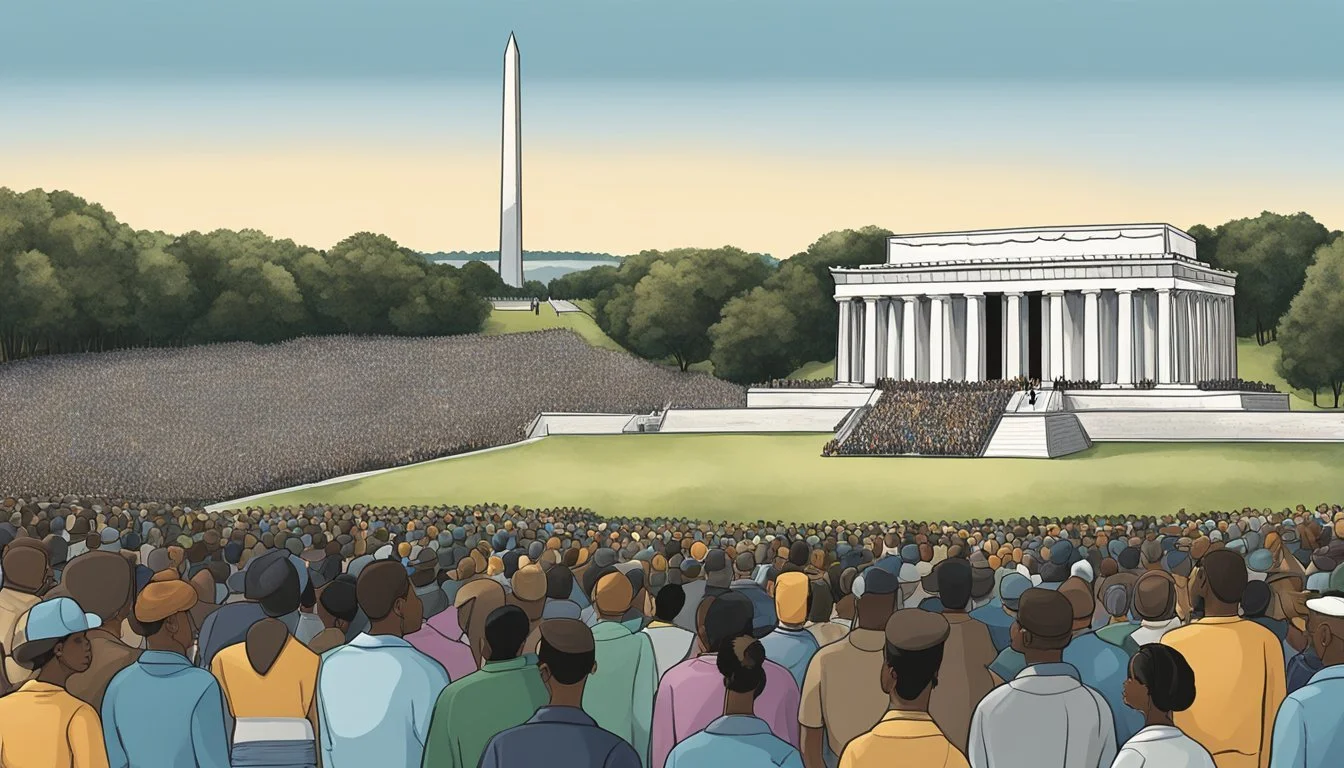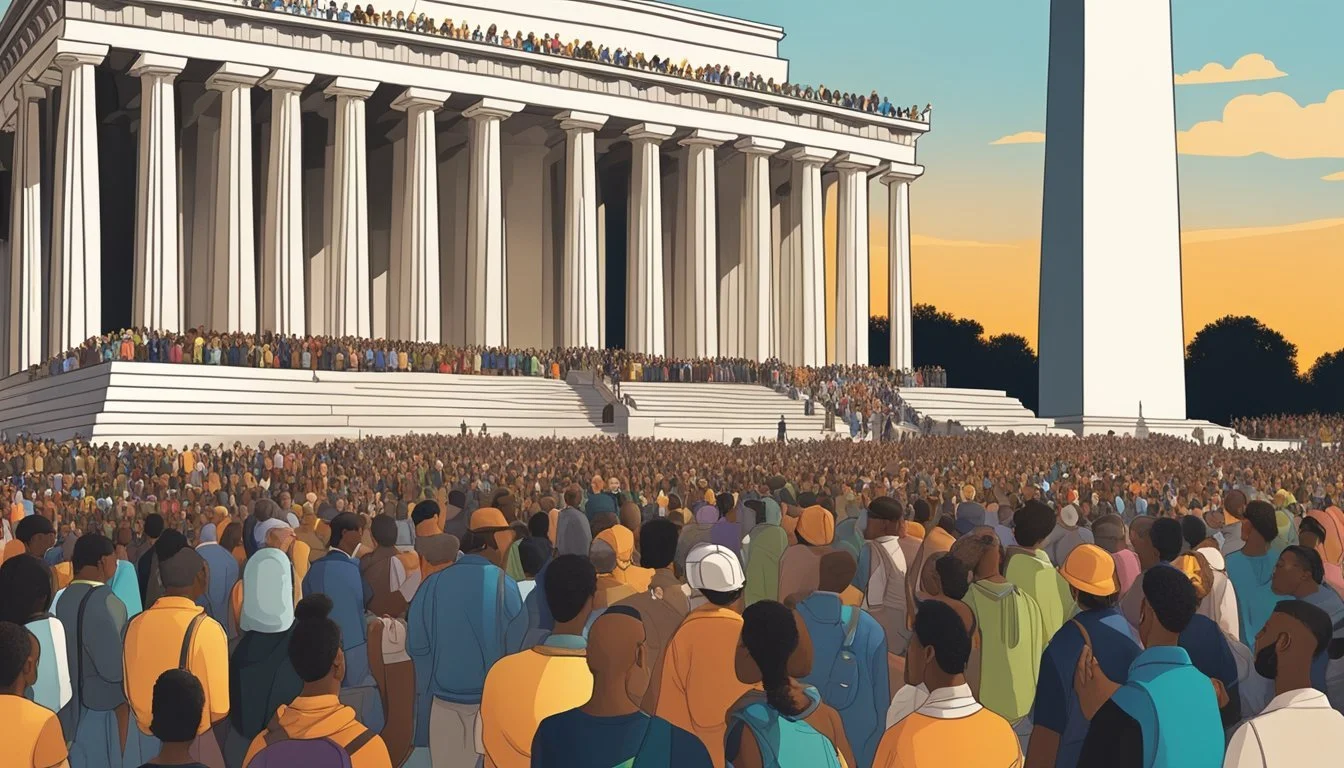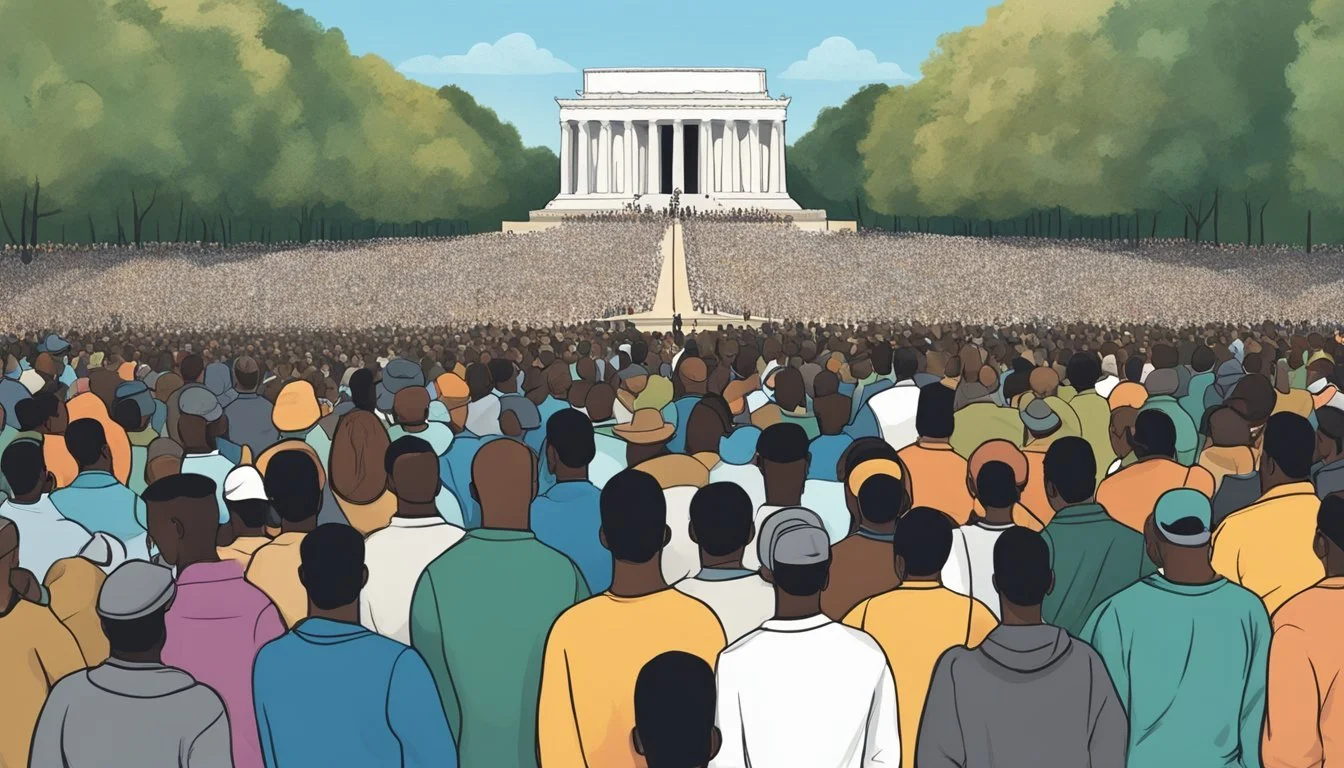7 Inspiring Films on MLK's I Have a Dream Speech
Cinematic Tributes to a Historic Moment
Martin Luther King Jr.'s "I Have a Dream" speech stands as a pivotal moment in American history, inspiring generations to strive for equality and justice. This powerful address has been immortalized not only in written records but also through various cinematic portrayals that bring its message to life.
Films about King's iconic speech offer viewers a chance to experience the emotion and impact of that historic day in Washington D.C. These movies provide unique perspectives on the civil rights movement, exploring the context surrounding the speech and its lasting influence on society. From documentaries to animated features, each film presents a different facet of King's dream and its ongoing relevance.
1) Selma
Selma depicts the historic 1965 voting rights marches from Selma to Montgomery, Alabama. The film focuses on Dr. Martin Luther King Jr.'s leadership during this pivotal moment in the civil rights movement.
Director Ava DuVernay brings nuance to King's portrayal, showing him as a complex figure grappling with personal and political challenges. The movie highlights King's powerful oratory skills, including references to his famous "I Have a Dream" speech.
David Oyelowo delivers a compelling performance as Dr. King, capturing his charisma and conviction. The film also explores the broader context of the civil rights struggle, showcasing the courage of activists who faced violent opposition.
Selma received critical acclaim for its historical accuracy and emotional impact. It serves as a powerful reminder of the sacrifices made in the fight for voting rights and racial equality.
https://en.wikipedia.org/wiki/Selma_(film)
2) Boycott
"Boycott" brings to life the pivotal Montgomery Bus Boycott of 1955-1956. This powerful film stars Jeffrey Wright as Dr. Martin Luther King Jr., capturing his early days as a civil rights leader.
The movie portrays the events that sparked the boycott, including Rosa Parks' arrest for refusing to give up her bus seat. It depicts the challenges faced by the African American community during the 381-day protest.
"Boycott" showcases Dr. King's emerging leadership skills and his commitment to nonviolent resistance. The film highlights the sacrifices made by ordinary citizens who walked miles to work rather than ride segregated buses.
Through dramatic reenactments, the movie illustrates the unity and determination of the Montgomery community. It also explores the personal struggles of Dr. King and his family as they faced threats and intimidation.
By focusing on this crucial chapter in civil rights history, "Boycott" provides context for King's later "I Have a Dream" speech. It demonstrates how grassroots activism laid the foundation for the broader Civil Rights Movement.
[https://www.imdb.com/title/tt0251046/]
3) King: A Filmed Record... Montgomery to Memphis
This 1970 documentary chronicles the life and work of Dr. Martin Luther King Jr. It features extensive footage of King's speeches and civil rights activism.
The film includes several of King's most impactful orations, including his iconic "I Have a Dream" speech from the 1963 March on Washington. Viewers can experience the full power of King's words in their original context.
Other notable speeches showcased in the documentary are King's 1955 address in Montgomery before the bus boycott and his final "I've Been to the Mountaintop" speech delivered the night before his assassination.
The film provides a comprehensive look at King's role in the Civil Rights Movement, from the Montgomery bus boycott to the Memphis sanitation workers' strike. It captures key moments in the struggle for racial equality.
By presenting King's speeches and activism chronologically, the documentary offers valuable historical context for understanding his message and impact.
https://www.imdb.com/title/tt0065987/
4) The Butler
"The Butler" portrays the Civil Rights Movement through the eyes of Cecil Gaines, a White House butler who served eight presidents. The film incorporates Martin Luther King Jr.'s "I Have a Dream" speech as a pivotal moment in the struggle for equality.
Cecil's son Louis participates in the March on Washington, where King delivers his iconic address. This scene juxtaposes Cecil's cautious approach to progress with Louis' more active involvement in the movement.
The movie illustrates how King's words resonated across generations and social classes. It shows the speech's impact on both those directly involved in the Civil Rights Movement and those witnessing it from different perspectives.
"The Butler" uses King's speech to highlight the complexities of racial progress in America. It demonstrates how the message of equality and justice affected individuals in various positions of society.
https://en.wikipedia.org/wiki/The_Butler
5) The March
"The March" is a powerful documentary that captures the historic 1963 March on Washington for Jobs and Freedom. Released in 2013, this film provides a vivid account of the events leading up to Martin Luther King Jr.'s iconic "I Have a Dream" speech.
Directed by John Akomfrah, the documentary combines rare archival footage with interviews from key participants. It offers viewers a behind-the-scenes look at the organization and execution of this pivotal moment in the Civil Rights Movement.
The film highlights the diverse coalition of civil rights leaders who came together to plan the march. It showcases the challenges they faced and the strategies they employed to mobilize thousands of people from across the nation.
"The March" culminates with King's electrifying speech, providing context for its enduring impact. The documentary serves as a testament to the power of peaceful protest and collective action in advancing social change.
https://www.imdb.com/title/tt3155754/
6) Eyes on the Prize
Eyes on the Prize is a landmark documentary series that explores the American Civil Rights Movement. The series includes powerful footage of Martin Luther King Jr.'s "I Have a Dream" speech, providing crucial context for this historic moment.
The documentary presents interviews with key figures and eyewitnesses, offering unique perspectives on the speech's impact. It showcases the preparation and organization behind the March on Washington, where King delivered his famous address.
Eyes on the Prize highlights the speech's significance within the broader struggle for civil rights. The series demonstrates how King's words resonated beyond that day, inspiring continued action and change.
By incorporating archival footage and first-hand accounts, the documentary brings viewers closer to the experience of those present at the Lincoln Memorial. It captures the energy and emotion of the crowd as King spoke his memorable words.
[https://en.wikipedia.org/wiki/Eyes_on_the_Prize]
7) King in the Wilderness
King in the Wilderness is a powerful documentary that focuses on the final years of Martin Luther King Jr.'s life. The film provides a unique perspective on King's legacy beyond his famous "I Have a Dream" speech.
Directed by Peter Kunhardt, the documentary explores the challenges King faced during his last 18 months. It delves into his efforts to combat poverty and his opposition to the Vietnam War.
The film features interviews with King's closest friends and confidants. These intimate accounts offer viewers a deeper understanding of King's personal struggles and the complexities of his leadership.
King in the Wilderness presents rare archival footage and photographs. These visual elements help bring King's final years to life, showcasing his continued commitment to social justice.
The documentary premiered at the Sundance Film Festival in 2018. It later aired on HBO, reaching a wide audience and garnering critical acclaim for its insightful portrayal of King's later years.
https://en.wikipedia.org/wiki/King_in_the_Wilderness
Historical Context of the Speech
Martin Luther King Jr.'s "I Have a Dream" speech emerged during a pivotal moment in American history. It addressed longstanding racial injustices and called for equality and freedom for all.
The Civil Rights Movement
The 1950s and early 1960s saw significant developments in the fight for civil rights. The Montgomery Bus Boycott of 1955-1956 propelled King to national prominence. This 381-day protest against segregated public transportation sparked widespread activism.
In 1954, the Supreme Court's Brown v. Board of Education decision ruled racial segregation in public schools unconstitutional. This landmark case challenged the "separate but equal" doctrine.
Sit-ins and freedom rides became powerful tools for nonviolent resistance. African Americans and their allies protested segregation in public spaces and interstate transportation.
March on Washington for Jobs and Freedom
On August 28, 1963, over 250,000 people gathered in Washington D.C. for the March on Washington. This massive demonstration aimed to pressure the federal government to act on civil rights issues.
The march focused on ending racial segregation in public schools and racial discrimination in employment. It also called for a $2 minimum wage and protection from police brutality.
King delivered his iconic speech as the final address of the march. His words resonated with the crowd and millions watching on television, crystallizing the goals of the Civil Rights Movement.
The march played a crucial role in the passage of the Civil Rights Act of 1964 and the Voting Rights Act of 1965. These laws marked significant progress in dismantling legal racial discrimination in the United States.
Themes Explored in the Films
The films depicting Martin Luther King Jr.'s "I Have a Dream" speech delve into powerful themes that resonate with audiences. These works examine the ongoing struggle for equality and the enduring hope for a better future.
Equality and Justice
Films about King's iconic speech often highlight the fight for racial equality and social justice. They portray the stark realities of segregation and discrimination faced by African Americans in the 1960s. Many depict the nonviolent protests and civil disobedience tactics used to challenge unjust laws.
Some films focus on specific incidents that inspired the Civil Rights Movement, such as the Montgomery Bus Boycott or the Birmingham Campaign. Others explore the broader societal impact of systemic racism and the long-term effects on communities.
These works often emphasize King's vision of a nation where people are judged by their character rather than their skin color. They illustrate how this message continues to be relevant in modern times.
Hope and Perseverance
A central theme in films about the "I Have a Dream" speech is the power of hope in the face of adversity. They showcase King's unwavering belief in the possibility of positive change, even in difficult circumstances.
Many films highlight the courage and determination of civil rights activists who faced violence, imprisonment, and social ostracism. They depict the personal sacrifices made by individuals committed to the cause of equality.
The theme of perseverance is often explored through the long-term struggle for civil rights. Films may trace the movement's progress from the 1950s through the 1960s and beyond, showing both setbacks and triumphs.
Some works also examine how King's message of hope continues to inspire new generations of activists and leaders working for social justice.







